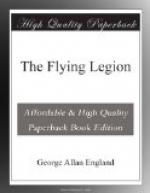“There, M’alme,” whispered the Arab, in a choking voice. “Now I have told you the secret of all secrets, and have lost my soul. I have revealed the inner mystery of Islam, that to this day no man of the Feringi hath ever known. I am a very great man of sin, and should have first torn out my tongue.
“But my life is in your hands, Master, and I have shared your salt. Allah knows I was forced to speak. Shal’lah! (It is Allah’s will!) Allah will weigh my heart and will forgive, for he is the Compassionate, the Merciful! I beg you, Master, now let me go!”
“Soon, Rrisa,” the chief answered, turning away from the map. “But first there is something of highest import I must show thee.”
“And what may that be, my sheik?” the Arab queried, his widening eyes fixed on the blanket that covered the loot from Mecca. Instinctively he sensed that some horrible sight was about to be presented to him. His face paled even more. He licked dry lips with a tongue equally dry, and leaned against the table to steady himself. “What have you now to show me, O M’alme?”
“Listen!” the chief commanded sternly. “The Meccans are a people corrupt and accursed. ’Their hearts are black as their skins are white.’ They live by fleecing the Hujjaj, by making sale and barter of relics, by turning the holy places into marts of trade. All this is well known throughout Islam. Ah, the degenerate breed of the sons of the Prophet!”
“That is true, Master. And what then?”
“Is it not a fact that they could not even safeguard the Kaukab el Durri from the hand of the Great Apostate Sheik? How much less, then, could they protect their other and more sacred things, if some Shiah dog should come to rob them of the things they value?
“Would it not be better that such things should be carried far from danger, to the hidden, inner city? I ask thee this, Rrisa; would it not be better far?”
“And what is the meaning of my master’s strange words?” ventured Rrisa, a sort of dazed horror dawning in his eyes. “The other and more sacred things of Islam—are they there under that cloth, O Master?”
“Thou hast said it, Rrisa! Now, behold them!”
With a quick, dramatic gesture, well-calculated to strike at the roots of the superstitious Arab’s nature, he flung away the blanket. To Rrisa’s horrified gaze appeared the Myzab and the sacred Black Stone.
“Ya Allah!” gulped the orderly, in a choking whisper. His face became a dull gray. His eyes, rimmed with white, stared in terror. His teeth began to chatter; and on his forehead appeared little glistening drops.
“O Master, that is not—.”
“Truly, yea! The Golden Waterspout, Rrisa, and the Black Stone itself! I am carrying them to the Very Heavenly City, far in the Iron Mountains! They shall be given to the Great Olema, there, who is more fit to guard and keep them than the Sheriff of Mecca or than his sons Feisal and the two Alis. No harm shall befall them, and—”




